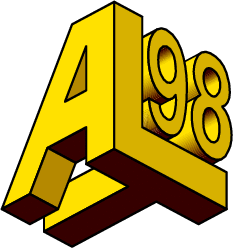|
Editors' Introduction | | 1 - 10
|
|
M.M. Richter,
C.H. Smith,
R. Wiehagen, and
T. Zeugmann
|
|
| |
|
| |
|
Inductive Logic Programming and Data Mining
| |
|
| |
|
Scalability Issues in Inductive Logic Programming
(Invited Lecture),
Abstract.
| | 11 - 30
| |
|
|
S. Wrobel
|
|
| |
|
| |
|
Inductive Inference
| |
|
| |
|
Learning to Win Process-Control Games Watching Game-Masters,
Abstract.
| | 31 - 45
|
|
J. Case, M. Ott,
A. Sharma, and
F. Stephan
| |
|
Closedness Properties in EX-identification of Recursive Functions,
Abstract.
| | 46 - 60
|
|
K. Apsitis,
R. Freivalds,
R. Simanovskis, and J. Smotrovs
|
|
| |
|
| |
|
Learning via Queries
| |
|
| |
|
Lower Bounds for the Complexity of Learning Half-Spaces with Membership
Queries,
Abstract.
| | 61 - 71
|
|
V.N. Shevchenko, and
N.Yu. Zolotykh
| |
|
Cryptographic Limitations on Parallelizing Membership and
Equivalence Queries with Applications to Random Self-Reductions,
Abstract.
| | 72 - 86
|
|
M. Fischlin
| |
|
Learning Unary Output Two-Tape Automata from Multiplicity and
Equivalence Queries,
Abstract.
| | 87 - 102
|
|
G. Melideo, and S. Varricchio
| |
|
Computational Aspects of Parallel Attribute-Efficient Learning,
Abstract.
| | 103 - 111
|
|
P. Damaschke
| |
|
PAC Learning from Positive Statistical Queries,
Abstract.
| | 112 - 126
|
|
F. Denis
|
|
| |
|
| |
|
Prediction Algorithms
| |
|
| |
|
Structured Weight-Based Prediction Algorithms ( Invited Lecture),
Abstract.
| | 127 - 142
|
|
A. Maruoka,
and E. Takimoto
|
|
| |
|
| |
|
Inductive Logic Programming
| |
|
| |
|
Learning from Entailment of Logic Programs with Local Variables,
Abstract.
| | 143 - 157
|
|
M.R.K. Krishna Rao,
and
A. Sattar
| |
|
Logical Aspects of Several Bottom-Up Fittings,
Abstract.
| | 158 - 168
|
|
A. Yamamoto
| |
|
Learnability of Translations from Positive Examples,
Abstract.
| | 169 - 178
|
|
N. Sugimoto
| |
|
Analysis of Case-Based Representability of Boolean Functions
by Monotone Theory,
Abstract.
| | 179 - 190
|
|
K. Satoh
|
|
| |
|
| |
|
Learning Formal Languages
| |
|
| |
|
Locality, Reversibility, and Beyond: Learning Languages from
Positive Data,
Abstract.
| | 191 - 204
|
|
T. Head,
S. Kobayashi, and
T. Yokomori
| |
|
Synthesizing Learners Tolerating Computable Noisy Data,
Abstract.
| | 205 - 219
|
|
J. Case, and
S. Jain
| |
|
Characteristic Sets for Unions of Regular Pattern Languages
and Compactness,
Abstract.
| | 220 - 233
|
|
M. Sato,
Y. Mukouchi, and D. Zheng
| |
|
Finding a One-Variable Pattern from Incomplete Data,
Abstract.
| | 234 - 246
|
|
H. Sakamoto
| |
|
A Fast Algorithm for Discovering Optimal String Patterns in Large
Text Databases,
Abstract.
| | 247 - 261
|
|
H. Arimura,
A. Wataki, R. Fujino, and
S. Arikawa
|
|
| |
|
| |
|
Inductive Inference
| |
|
| |
|
A Comparison of Identification Criteria for Inductive Inference
of Recursive
Real-Valued Functions,
Abstract.
| | 262 - 275
|
|
E. Hirowatari, and
S. Arikawa
| |
|
Predictive Learning Models for Concept Drift,
Abstract.
| | 276 - 290
|
|
J. Case,
S. Jain, S. Kaufmann,
A. Sharma, and
F. Stephan
| |
|
Learning with Refutation,
Abstract.
| | 291 - 305
|
|
S. Jain
| |
|
Comparing the Power of Probabilistic Learning and Oracle
Identification under Monotonicity Constraints,
Abstract.
| | 306 - 320
|
|
L. Meyer
| |
|
Learning Algebraic Structures from Text Using Semantical Knowledge,
Abstract.
| | 321 - 335
|
|
F. Stephan and Y. Ventsov
|
|
| |
|
| |
|
Inductive Logic Programming
| |
|
| |
|
LIME: A System for Learning Relations
( Invited Lecture),
Abstract.
| | 336 - 374
|
|
E. McCreath, and A. Sharma
|
|
| |
|
| |
|
Miscellaneous
| |
|
| |
|
On the Sample Complexity for Neural Trees,
Abstract.
| | 375 - 384
|
|
M. Schmitt
| |
|
Learning Sub-classes of Monotone DNF on the Uniform Distribution,
Abstract.
| | 385 - 399
|
|
K.A. Verbeurgt
| |
|
Using Attribute Grammars for Description of Inductive
Inference Search Space,
Abstract.
| | 400 - 408
|
|
U. Sarkans, and J. Barzdins
| |
|
Towards the Validation of Inductive Learning Systems,
Abstract.
| | 409 - 423
|
|
G. Grieser,
K.P. Jantke, and
S. Lange
| |
|
Consistent Polynomial Identification in the Limit,
Abstract.
| | 424 - 438
|
|
W. Stein
| |
|
|
Author Index | | 439
| |
|


 back to the ALT'98
Proceedings Page
back to the ALT'98
Proceedings Page